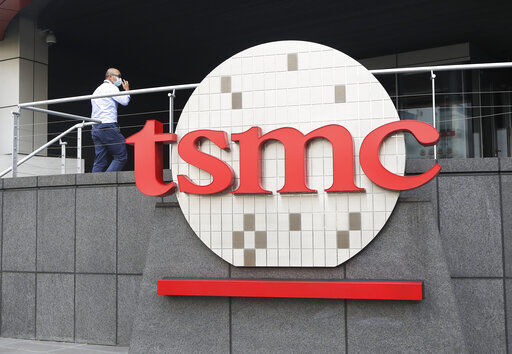TAIPEI, Taiwan — Taiwan Semiconductor Manufacturing Co., the biggest contract manufacturer of processor chips for smartphones and other products, said today that its quarterly profit rose 79.7% over a year earlier to a record $8.8 billion amid surging demand.
Quarterly revenue rose 47.9% over a year ago to $19.2 billion, the company reported.
TSMC, headquartered in Hsinchu, makes processor chips for brands including Apple Inc. and Qualcomm Inc. Many of its products are assembled by factories in China, which has exposed TSMC to the possible impact of U.S.-Chinese tension over technology and security.
TSMC’s U.S.-traded shares fell 14% in value after Washington on Friday tightened restrictions on Chinese access to advanced computer chips. Those controls are based on limiting the ability of TSMC and other suppliers to use U.S. chip or manufacturing technology for Chinese customers.
The American Embassy in Beijing didn’t immediately respond to a question about whether TSMC had received an exemption that might allow normal supplies to Chinese factories to continue.
TSMC’s CEO, C.C. Wei said in an earnings conference call that the rules set restrictions at very advanced levels mainly used for artificial intelligence or supercomputing applications.
“Therefore, our initial assessment is the impact to TSMC is limited and manageable,” Wei told analysts. “We are closely monitoring the situation to ensure we comply with all the rules and regulations.”
TSMC’s chip supplies to China already were restricted under a 2020 order by then-President Donald Trump that prohibits vendors from using U.S. technology to manufacture for Huawei Technologies Ltd., a maker of network switching gear and smartphones. Washington says Huawei is a security risk and might facilitate Chinese spying, which the company denies.
Chipmakers are benefiting for demand for next-generation telecoms, high-performance computing and chips for use in products from cars to medical devices.
TSMC announced plans last year to invest $100 billion over the next three years in manufacturing and research and development.
Most semiconductors used in smartphones, medical equipment, computers and other products are made in Taiwan, South Korea and China.
That has prompted concern among American officials about reliance on supplies that might be disrupted by conflict between China and Taiwan. They are lobbying TSMC and other chipmakers to set up factories in the United States.
TSMC announced plans last year to build its first chip factory in Japan. The company and Sony Corp. later said they would jointly invest $7 billion in the facility.
TSMC operates a semiconductor wafer fabrication facility in Camas, Wash., and design centers in San Jose, Calif., and Austin, Texas.
The company has announced plans for a second U.S. production site in Arizona.


